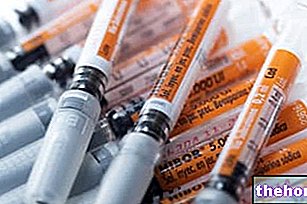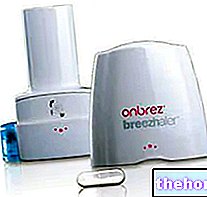Definition
An ulcer is defined as a well localized lesion involving the mucous membrane of the digestive system, exposed to the action of the acid juices secreted by the stomach. The gastric ulcer develops in the stomach, the duodenal ulcer in the upper part of the small intestine, while the esophageal ulcer affects the lower part of the esophagus.
Ulcer Causes
L"Helicobacter pylori it is certainly one of the major culprits of ulcer, among other causes include: incorrect eating habits, alcoholism, prolonged intake of certain drugs (NSAIDs and cortisone), bacterial infections, circulatory problems, stress and hormonal changes.
The imbalance of the defensive mechanisms (mucus, bicarbonate and blood flow) to the advantage of aggressive forces (excessive production of hydrochloric acid and digestive enzymes) generates the ulcer
Symptoms
Among the symptoms most frequently associated with gastric ulcer, heartburn is certainly the most common; however, a variety of prodrome can accompany the disorder. They include: aerophagia, iron deficiency anemia, diarrhea, weight loss, dysphagia, belching , nausea, loss of appetite, paleness, blood in the stool (tarry) and vomiting.
Natural Cures
Diet and Nutrition
Ulcer Information - Drugs to Treat Ulcer is not intended to replace the direct relationship between health professional and patient. Always consult your doctor and / or specialist before taking Ulcer - Drugs to Treat Ulcer.
Medicines
It is necessary to resort to drugs both for healing from the ulcer (and related lesions), and to prevent recurrence. Several classes of drugs are useful for treating the disease:
Histamine H2 receptor antagonists
Histamine, by binding to the H2 receptors, stimulates the proton pump by activating adenylate cyclase. By blocking this histamine stimulus on the proton pump, the drug prevents the formation of HCl
- Nizatidine: eg. Nizax, Cronizat, Zanizal: it is a drug that acts selectively at the level of histaminergic H2 receptors. It is recommended to administer one tablet (300 mg) or two tablets (150 mg) twice a day for 1-2 months. Particularly indicated for ulcer associated with NSAIDs.
- Cimetidine: eg. Ulis, Biomag, Tagamet: oral administration of the drug is recommended, one tablet (400 mg) 4 times a day for 4-8 weeks. It is also possible to administer the drug intramuscularly (200 mg every 4-6 hours) or slow intravenous (200-400 mg in at least 5 minutes, every 4-6 hours).
Antacids (eg aluminum hydroxide + magnesium hydroxide: Maalox plus): these drugs are particularly indicated in case of heartburn associated with indigestion. It is preferable to associate together the two active ingredients, since they have opposite side effects (magnesium hydroxide is a laxative, aluminum hydroxide is responsible for constipation). Take 2-4 tablets per day (500-1500 mg) with plenty of water, 20-60 minutes before meals and at bedtime.
It is also possible to take sodium bicarbonate (NaHCO3): this substance acts quickly, but has unpleasant side effects (alkalinization of the urine, swelling, hypersodemia).
Proton pump inhibitors
These drugs carry out their action through a double mechanism:
- They act on the proton pump → block the production of histamine, gastrin, ac. Choline
- Promote the eradication of Helicobacter pylori (in association with antibiotics)
- Pantoprazole (eg. Peptazol, Pantorc, Nolpaza, Gastroloc): indicated for ulcer caused by esophageal reflux disease. Orally, take one 40 mg tablet once a day for 8 weeks. If there is no complete healing at the end of the treatment, repeat the treatment for another 8 weeks. Parenterally, administer 40 mg per day for a period ranging from 7 to 10 days (intravenous infusion duration: not less than 15 minutes). Parenteral therapy should be stopped when the subject is able to take the drug orally.
- Omeprazole (eg. Antra, Nansem, Losec, Xantrazol): for the treatment of duodenal ulcer take 20 mg of the drug once a day, before a meal. Treatment should generally be continued for a period ranging from 4 to 8 weeks, according to as indicated by the doctor Increase the dosage to 40 mg once a day in case of gastric ulcer.
- Lansoprazole (eg Pergastid, Lomevel, Lansox): in case of duodenal ulcer, take 15 mg orally once a day, 30 minutes before the main meal. The treatment cycle lasts 4 weeks, unless otherwise indicated by a doctor.
Protectors of the gastric mucosa
They exert a "protective action on the gastric mucosa, and exhibit antibacterial properties: their action is enhanced when they are taken together with proton pump inhibitor drugs."
- Sucralfate (eg Degastril, Citogel): take orally one 1 gram tablet on an empty stomach 4 times a day, or 2 grams twice a day. This posology is indicated for gastric, duodenal ulcer and reflux oesophagitis.
- Bismuth compounds (eg bismuth salicylate): take 524 mg per os every 30-60 minutes as needed (no more than 8 doses per day). Alternatively, take 1048 mg orally every hour (no more than 4 doses per day). Against Helicobacter pylori, take 524 mg of the drug 4 times a day for six weeks; reduce the dosage to 262 mg in case of Helicobacter ulcer in children under 10 years of age.
Prostaglandin analogs
These drugs are indicated in cases of gastric and duodenal ulcer for their protective and antisecretive properties of the mucosa. The administration of these active ingredients is also recommended for ulcer prevention.
- Misoprostol (eg Cytotec) take one 200 mg tablet 4 times a day, after meals and in the morning. The treatment must be continued for at least 4 weeks: if the patient still complains of ailments, the treatment must be continued for another 8 weeks.
This drug is especially recommended for prolonged NSAID therapy.
Antimicrobials
- Amoxicillin (eg Augmentin, Klavux) belongs to penicillins: it is a bactericide capable of inhibiting the synthesis of the cell wall of the bacteria (Helicobacter pylori). Take one tablet orally (1 gram) 2-3 times a day for 14 days. Amoxicillin is often used in combination with metronidazole and bismuth derivatives, or with proton pump inhibitors.
- Metronidazole (eg. Metronid, Deflamon): take one 250 mg tablet every 6 hours. Also this drug is always prescribed in combination with a proton pump inhibitor or bismuth derivatives: approximately, the cure against gastritis through this drug should be continued for 14 days.
Other articles on "Ulcer - Drugs to Treat" Ulcer "
- Peptic ulcer therapy
- Peptic ulcer
- Grastic ulcer
- Duodenal ulcer
- Ulcer: herbal medicine and natural remedies




























